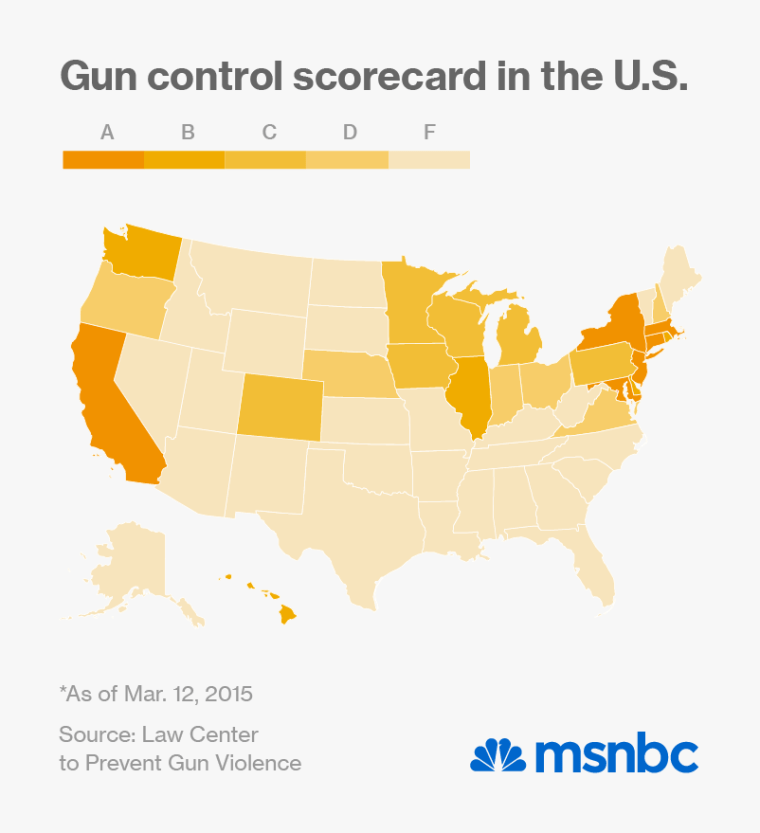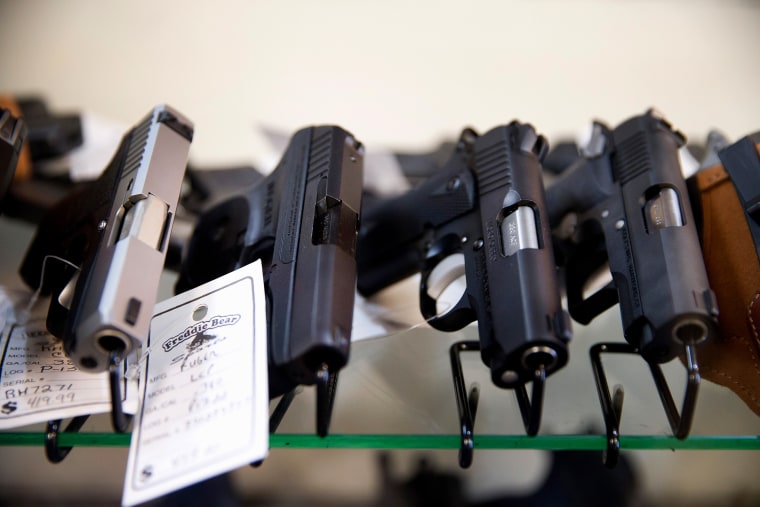For felons looking to trade guns, look no further than Arizona, Alaska and Wyoming -- the top three states to buy, sell or traffic firearms, according to a new report.
The new ranking comes from the Brady Campaign to Prevent Gun Violence, a group working to strengthen background checks for gun sales, which launched its latest state scorecard Thursday comparing gun laws' ability to keep weapons out of the hands of criminals or abusers. A loophole in the federal system currently allows people to buy firearms sold online and at gun shows without first passing a background check.
The Brady Campaign analyzed 33 gun policies in each state and found that many make it "far too easy" for criminals and people with severe mental illnesses to obtain guns. Some of the areas the organization looked at include laws requiring companies to videotape all gun sales, stores to verify inventory through dealer records, individuals to report lost or stolen weapons and businesses to prevent bulk purchases of handguns to potential traffickers.
Twelve states -- Louisiana, Montana, Arkansas, Virginia, Kentucky, Florida, Nevada, Maine, Mississippi, Idaho, New Mexico, and Alabama -- also earned the group's "2015 Criminals' Choice Award." And 10 states made the "Traffickers' Top 10" list for laws accommodating criminals who buy guns in bulk in states with weak gun laws and then resell them in states with strong gun laws.
RELATED: US gun ownership is declining
The grades are showcased on a parody website, CrimAdvisor.com, which highlights the "friendliest states" for criminals to buy, carry or traffic guns. Their satirical motto reads: "A criminal’s best shot at finding a gun … No matter who you are or what you’ve done."
The top states with gun-control legislation, referred to on the website as the "least friendly states," include California, Connecticut, Massachusetts, New Jersey and New York, ranked in order. Law enforcement officials in California, for example, have full discretion when deciding who is lawfully able to carry a gun, the Brady Campaign points out.

In neighboring Arizona, however, residents can carry a loaded hidden gun without a permit and non-residents can get a carry permit through the mail. Four years ago, a gunman opened fire outside of a supermarket in Tucson, killing six people and wounding 13 others, including former Rep. Gabrielle Giffords. The shooter, Jared Lee Loughner, had acquired his gun legally and was not prohibited from owning one.
The majority of gun laws enacted in the past two years have originated in state houses across the country, not in the halls of Congress. Thirty-seven states have passed an unprecedented 99 laws to strengthen gun regulations since 2013, according to the Law Center to Prevent Gun Violence. Five states -- Colorado, Connecticut, Delaware, New York, and Washington -- have expanded background checks to all gun sales since the December 2012 shooting at Sandy Hook Elementary School in Newtown, Connecticut. As a result, one in three Americans now live in states that protect them with expanded background checks.
RELATED: Bipartisan bill aims to close gun loophole
But federal lawmakers haven't taken up the issue since the Senate failed to expand background checks on all commercial gun sales in April 2013. It wasn’t just a big victory for the National Rifle Association and a defeat for those looking to reduce gun violence in America. It also created a narrative that gun rights groups were winning the political fight over the issue. But, nearly two years after Republican leadership blocked the bill, a bipartisan group of legislators last week reintroduced a gun-control bill aimed at preventing criminals and people with severe mental illnesses from buying guns during every commercial sale.
The only piece of gun legislation agreed on by both the House and Senate in 2014 was the Omnibus Appropriations Act, which President Barack Obama signed into law last December.
The Brady Campaign has ranked states by their gun policies since 1998. This year, they focused entirely on what states are doing or not doing around keeping guns out of criminals' hands.
